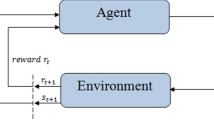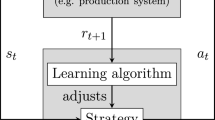Abstract
The economy of production in flexible manufacturing systems (FMS) depends mainly on how effectively the production is planned and how the resources are used. This requires efficient and dynamic factory scheduling and control procedures. This paper addresses two knowledge-based scheduling schemes (work cell attribute oriented dynamic schedulers “WCAODSs”) to control the flow of parts efficiently in real-time for FMS in which the part-mix varies continually with the planning horizon. The present work employs a hybrid optimisation approach in the generalised A1 framework. A genetic algorithm that provides an optimal combination of a set of priority dispatching rules, one for each work cell “WC” (WCwisepdr set), for each of the problem instances characterised by their WC attributes, is used for generating examples. The WC attributes reflect the information about the operating environment of each individual WC. Two inductive learning algorithms are employed to learn the examples, and scheduling rules are formulated as a knowledge base. The learning algorithms employed are: the Genetic CID3 (Continuous Interactive Dichotomister3 algorithm extended with genetic program for weight optimisation) and the Classification Decision Tree algorithm. The knowledge base obtained through the above learning schemes generates robust and effective schedules intelligently with respect to the part-mix changes in real-time, for makespan criteria. The comparison made with a GA-based scheduling methodology shows that WCAODSs provide solutions closer to the optimum.
Similar content being viewed by others
References
J. Hutchison, “Current and future issues concerning FMS scheduling”, International Journal of Management Sciences, 19(6), pp. 529–537, 1991.
P. Mellor, “A review of job shop scheduling”, Operation Research Quarterly, 17(2), pp. 161–171, 1966.
P. Brucker, Scheduling Algorithms, Springer-Verlag, 1st edn, 1995.
B. Giffler and G. L. Thompson, “Algorithms for solving production scheduling problems”, International Journal of Operations Research, 8, pp. 487–503, 1960.
K. Shanker and A. K. Agrawal, “Loading problem and resource considerations in FMS: a review”, International Journal of Production Economics, 25, pp. 111–119, 1991.
S. Ghosh and C. Gaimon, “Routing flexibility and production scheduling in a flexible manufacturing system”, European Journal of Operations Research, 60, pp. 344–364, 1992.
V. Selladurai, P. Aravindan, S. G. Ponnambalam and A. Gunasekaran, “Dynamic simulation approach of job shop scheduling for optimal performance”, International Journal of Operation and Production Management, 15(7), pp. 106–120, 1995.
S. M. Lee and H.-J. Jung, “A multi-objective production planning model in a flexible manufacturing environment”, International Journal of Production Research, 27(11), pp. 1981–1992, 1989.
H. H. Greenberg, “A branch and bound solution to the general scheduling problem”, International Journal of Operations Research, 16, pp. 353–361, 1968.
M. A. Nascimento, “Giffler and Thompson algorithm for job shop scheduling is still good for flexible manufacturing systems”, Journal of the Operational Research Society, 44(5), pp. 521–524, 1993.
D. J. Hoitomt, P. B. Luh and K. R. Pattipati, “A practical approach to job-shop scheduling problems”, IEEE transactions on Robotics and Automation, 9(1), pp. 1–13, 1993.
H. Adelsberger, M. Neubaurer and J. M. Pawlowski, “Genetic algorithms for scheduling: An in-depth analysis and comparison with simulated annealing”, Proceedings of the First International Conference on Operations and Quantitative Management, 2, pp. 514–521, 1997.
P. J. O'Grady and C. Harrison, “A general search sequencing rule for job sequencing”, International Journal of Production Research, 23(5), pp. 961–973, 1985.
J. E. Beigel and J. J. Davern, “Genetic algorithms and job-shop scheduling”, International Journal on Computers and Industrial Engineering, 19(1–4), pp. 81–90. 1990.
R. E. Billo, B. Bidanda and D. Tate, “A genetic algorithm formulation of the cell formation problem”, Proceedings of the 16th International Conference on Computers and Industrial Engineering, 7–9 March, pp. 341–344, 1994.
E. H. H.-P. Wiendahl and R. Garlichs, “Decentral production scheduling of assembly systems with genetic algorithm”, Annals of the CIRP 43(1), pp. 389–395, 1994.
C. Chiu and Y. Yih, “A learning-based methodology for dynamic scheduling in distributed manufacturing systems”, International Journal of Production Research, 33(11), pp. 3217–3232, 1995.
J. Sridhar and C. Rajendran, “Scheduling in flow shop and cellular manufacturing with multiple objectives — a genetic algorithmic approach”, International Journal of Production Planning and Control, 7(4), pp. 374–382, 1996.
H. Kopfer and D. C. Mattfield, “A hybrid search algorithm for the job shop problem”, Proceedings of the First International Conference on Operations and Quantitative Management, 2, pp. 498–505, 1997.
S.-Y. D. Wu and R. A. Wysk, “Multi-pass expert control system — a control/scheduling structure for flexible manufacturing cell”, Journal of Manufacturing Systems, 7(2), pp. 107–120, 1988.
M. J. Shaw and I. Whinston, “A distributed scheduling method for computer integrated manufacturing; the use of local area networks in cellular systems”, International Journal of Production Research, 25(9), pp. 1285–1303, 1987.
J. Chandra and J. Talvage, “Intelligent dispatching for flexible manufacturing”, International Journal of Production Research, 29(11), pp. 2259–2278, 1991.
S. Nakasuka and T. Yoshida, “Dynamic scheduling system utilizing machine learning as a knowledge acquisition tool”, International Journal of Production Research, 30(2), pp. 411–431, 1992.
D. C. Li and I.-S. She, “Using unsupervised learning technologies to induce scheduling knowledge for FMSs”, International Journal of Production Research, 32(9), pp. 2187–2199, 1995.
L.-C. Wang, H.-M. Chen and C.-M. Liu, “Intelligent scheduling of FMSs with inductive learning capability using neural networks”, The International Journal of Flexible Manufacturing Systems, 7, pp. 147–175, 1995.
J. Schultz and P. Mertens, “A comparison between an expert system, a GA and priority for production scheduling”, Proceedings of the First International Conference on Operations and Quantitative Management”, 2, pp. 505–513, 1997.
A. M. Waiker, B. R. Sarker and A. M. Lal, “A comparative study of some priority dispatching rules under different shop loads”, International Journal of Production Planning Control, 6(4), pp. 301–310, 1995.
T. S. Chan and H. A. Pak, “Heuristical job allocation in a flexible manufacturing system”, The International Journal of Advanced Manufacturing Technology, 1(2), pp. 69–90, 1986.
Y.-L. Chang and R. S. Sullivan, “Schedule generation in job shop”, International Journal of Production Research, 28(1), pp. 65–74, 1990.
M. P. Fanti, E. L. O. Valvo, M. Piecentini and G. Piscitellil, “Real-time routeing selection in flexible manufacturing systems”, Proceedings of IMTDR Conference, New Delhi, pp. 727–732, 1993.
Y.-D. Kim and C. A. Yano, “Heuristic approaches for loading problems in flexible manufacturing systems”, IIE Transactions, 25(1), pp. 26–38, 1993.
D. Y. Lee and F. Dicesare, “Scheduling flexible manufacturing systems: Using pertinets and heuristic search”, IEEE Transactions on Robotics and Automation, 10(2), pp. 23–132, 1994.
Y. Arzi, “On-line scheduling in a multi-cell flexible manufacturing system”, International Journal of Production Research, 33(12), pp. 3283–3300, 1995.
N. Jawahar, P. Aravindan and S. G. Ponnambalam, “A genetic algorithm for scheduling FMS”, Proceedings of the International Conference EUFIT'96, 2–5 September, Aachen, Germany, 1996.
K. J. Cios and N. Liu, “A machine learning method for generation of a neural network architecture: A continuous ID3 algorithm”, IEEE Transactions on Neural Networks, 3(2), pp. 2800–291, 1992.
R. Forsythe and R. Rada, Machine Learning, 1st edn, Ellis Horwood, 1986.
J. R. Quinlan, “Simplifying decision rules”, International Journal of Man-Machine Studies, 27, pp. 221–234, 1987.
Author information
Authors and Affiliations
Corresponding author
Rights and permissions
About this article
Cite this article
Jawahar, N., Aravindan, P., Ponnambalam, S.G. et al. Knowledge-based workcell attribute oriented dynamic schedulers for flexible manufacturing systems. Int J Adv Manuf Technol 14, 514–538 (1998). https://doi.org/10.1007/BF01351397
Issue Date:
DOI: https://doi.org/10.1007/BF01351397




